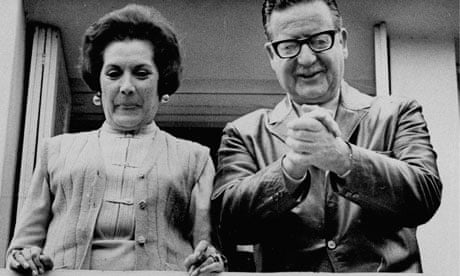A scientific autopsy has confirmed that Chilean president Salvador Allende committed suicide during the 1973 coup that toppled his socialist government, court officials have announced.
British ballistics expert David Prayer said Allende died of two shots fired from an assault rifle that was held between his legs and under his chin and was set to fire automatically. The bullets blew out the top of his head and killed him instantly.
The forensics team's conclusion was unanimous. Spanish expert Francisco Etxeberria said: "We have absolutely no doubt" that Allende committed suicide.
Prayer said two bullets were fired, two casings recovered and there was no evidence a second person was involved in Allende's death. That ruled out theories that Allende, the first socialist in the Americas to come to power at the ballot box, was killed by the military as troops stormed the presidential palace during the coup led by General Augusto Pinochet.
Allende had said he wouldn't be taken alive even as Pinochet ordered an all-out attack on La Moneda. The palace was bombed by fighter jets and the air thick with tear gas and smoke as the building went up in flames. Allende had ordered his allies to surrender, but he stayed behind. What happened next has always been shrouded in mystery.
The deposed president's body was exhumed in May for its first authoritative autopsy as Chile's independent judiciary began a criminal investigation into the death of Allende and hundreds of other victims of the Pinochet dictatorship.
Dr Patricio Bustos, who directs Chile's Medical Legal Service, announced the autopsy results, which he described as definitive, on Tuesday. Ever since Allende's death, Chile's military has maintained that he committed suicide, while others, notably Cuban leader Fidel Castro and Nobel prize-winning writer Gabriel Garcia Marquez, wrote that Allende went down fighting. Others more recently claimed he tried to kill himself but was only gravely wounded and was then killed by a bodyguard, who then died himself.
The experts also determined that Allende died using the AK-47 Castro had given him while visiting Chile two years earlier.
This autopsy supports the version of Dr Patricio Guijon, who had been part of Allende's medical team and said he alone witnessed the death.
Guijon described those moments in an interview just before the autopsy began. He said that with the palace in flames, Allende told the 30 to 40 people who had stayed with him that they would surrender together, and that he would take up the rear as they filed out.
Instead, the president slipped off alone to the palace's Independence Hall. Guijon, meanwhile, realised he had left his gas mask behind and went to retrieve it. It was then he saw Allende through an open door, he said, just as the president's body jerked upwards with the force of the blast.
This was the second autopsy performed on Allende's body. The first was done secretly and in irregular fashion by the military that night, before the body was quickly buried in a relative's crypt. Allende was eventually reburied with honours in Santiago, and his daughter Isabel, now a senator, had refused for years to allow another autopsy.
Now, however, she said it was a relief to know that science supports what the family has always believed.
"President Allende, on September 11, 1973, faced with the extreme circumstances that he was living through, took the decision to end his life, rather than be humiliated," Allende said.
Before making the autopsy results public, the autopsy team met for several hours with Judge Mario Carroza, Senator Allende and a family lawyer to explain the conclusions. Chile's supreme court has assigned Carroza to investigate Allende's death as well as that of 725 other people who were killed or disappeared during the 1973-1990 Pinochet dictatorship.
